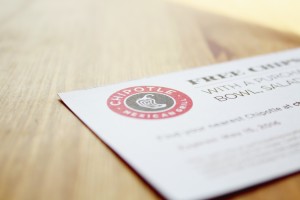Chipotle was one of the few restaurant chains to graduate beyond chain status; one of those restaurants that, despite their corporate structure, enjoyed an almost cult-like following. They were socially conscious. They used quality, “fresh” ingredients. They had what we assumed was integrity, publicly dropping carnitas (one of their most popular protein choices) when they couldn’t source non-GMO pork.
They seemed golden.
But then, like a beloved Hollywood movie star who can seemingly do no wrong getting arrested on molestation charges, Chipotle fell from grace. One, two, three, then dozens of cases of foodborne illness linked to Chipotle were reported. People were getting sick all across the country, most notably from E. coli. 64 cases of Salmonella poisoning were reported here in Minnesota during August and September of 2015. The source was Chipotle’s tomatoes.
It was all over the news. People sick. People scared.
Chipotle was cleared by the CDC after the E. coli outbreak was linked to the Australian beef they were using (and their signs now tout ingredients “locally-sourced,” so, at least closer than Australia). They then dumped millions into a new marketing campaign, and even closed completely for a day in February for a “mandatory food safety training” session.
But can they survive the scandal?
Well, other restaurant chains have.
Fast food giants like McDonald’s (in 1982, the first documented case of E. coli linked to food), Burger King (1997), Wendy’s (2006), and Taco Bell (2006, and multiple other times) have all caused foodborne sickness. They’ve continued on mostly unscathed, though without the level of news coverage that Chipotle received.
Some might say that this is unsurprising; that when you indulge in fast food you’re playing with fire anyway. But even “healthier” options like Jimmy John’s have been involved in serious outbreaks that weren’t covered in the news the same way that Chipotle’s was.
It was speculated (most notably in a VOX article found here), that Chipotle had spent too much time and resources on its anti-GMO campaign to focus on food safety in a “guns or butter” macroeconomic analysis, i.e. a dollar spent fear mongering about GMOs was a dollar not spent on food safety.
As many people have never heard of the outbreaks at the aforementioned restaurant chains one has to wonder, was Chipotle’s really that much worse? Or was it because Chipotle was so beloved that the media capitalized on the negative for clicks?
The “everybody wants to see a hero fall” mentality?
Jimmy John’s E. coli outbreaks, first with their sprouts in 2008 (more than once), and then with their cucumbers as recently as 2013, never saw the same level of negative press or media frenzy. When they did face a lawsuit, it was because sandwiches had allegedly been served without the potentially harmful sprouts (and the plaintiffs won a pickle; if you’re interested in reading about that click here).
And no one was asking the kinds of questions, “Is Jimmy John’s too focused on freaky fast delivery to make quality food?” that popped up in reference to Chipotle’s business practices.
It seems as though the same thing that made Chipotle such a consumer darling is what came back to bite them. When using “fresh” ingredients, it is simply much more likely for outbreaks like these to occur. Maybe it was always just a matter of time before something like this happened.
And because they were so public about using fresh ingredients, and their war on GMOs etc., the consequences of a misstep were going to be equally so.
But if Chipotle became something of a pariah, it was only briefly: while they did experience their worst financial quarter since 2012 after the outbreak (and first instance of a sales decline since going public in 2006), things have more or less stabilized since then. They closed all of their locations for employee training on February 8, but very few Chipotle stores actually closed their doors for good.
In fact, at the start of February Chipotle’s stock was up more than 5 percent as their investors anticipated what CEO Steve Ells had been saying for a while: the outbreaks that occurred across 14 states and made dozens of people sick are finally a thing of the past.
We Americans seem pretty quick to forgive and forget when it comes to food safety, no matter how many reported cases and news stories there are about it. Chipotle certainly isn’t in the clear after the scandal, but they’re working hard to win back customers. With their dedication to making people happy (e.g. offering free burritos and other coupons to bring people back in), they’ll likely survive the crisis. It is unlikely, however, that they’ll ever regain the sterling reputation they once had.
